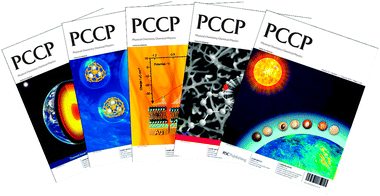Going from strength to strength
Abstract
Happy New Year from PCCP and welcome to the first issue of 2011! In this Editorial we will update you with our recent developments and would like to also share with you some of our highlights from the past year.
Another record-breaking year
In the last year, PCCP has continued to build on the successes we have enjoyed in recent years. We believe that PCCP has become established as a true “journal of choice” in the broad scientific communities it serves.Submissions have risen once again to a record high—growing by another 40% in 2010 compared to the previous year—equating to almost twice as many submissions as we received in 2008. Accordingly, PCCP has continued to grow significantly—publishing over 16![[thin space (1/6-em)]](https://www.rsc.org/images/entities/char_2009.gif) 000 pages in 2010—whilst still maintaining our strict quality standards and good author service.
000 pages in 2010—whilst still maintaining our strict quality standards and good author service.
Our Impact Factor rose yet again this year to 4.12—a new record high—and now leads the way with general physical chemistry journals (see Fig. 1).
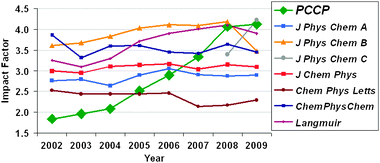 | ||
| Fig. 1 Impact Factor trends of general physical chemistry journals. | ||
Committed to quality and service
We believe that PCCP offers the best home for high-impact, insightful research in the fields of physical chemistry, chemical physics and biophysical chemistry. Our broad scope and international readership spans many communities. As well as the ‘core’ physical areas such as spectroscopy, kinetics, electrochemistry and theory, PCCP also covers interdisciplinary research areas from nanoscience to biophysical chemistry and from soft matter to surfaces/interfaces. Our aim continues to be publishing insightful research of the highest quality, covering the entire scope, in every issue. As an example of the journal's breadth, you can see the top 5 cited PCCP Perspective review articles in Table 1, as well as our lively range of themed issues in Table 2.| Title | Authors | DOI |
|---|---|---|
| Quantum dot-based resonance energy transfer and its growing application in biology | I. L. Medintz and H. Mattoussi | 10.1039/b813919a |
| Screened hybrid density functionals for solid-state chemistry and physics | G. E. Scuseria et al. | 10.1039/b812838c |
| On the concept of ionicity in ionic liquids | D. R. MacFarlane et al. | 10.1039/b900201d |
| Intrinsic quantum yields and radiative lifetimes of lanthanide tris(dipicolinates) | J.-C. G. Bünzli et al. | 10.1039/b816131c |
| Density functional theory for transition metals and transition metal chemistry | C. J. Cramer and D. G. Truhlar | 10.1039/b907148b |
| a Part of the biophysics and biophysical chemistry series. | |
|---|---|
| Physical chemistry of ionic liquids | Issue 8, 2010 |
| Biomolecular structures: from isolated molecules to living cellsa | Issue 14, 2010 |
| Interfacial systems chemistry: out of the vacuum, through the liquid, into the cell | Issue 17, 2010 |
| Molecular mechanisms of the photostability of lifea | Issue 19, 2010 |
| Recent developments in X-ray absorption spectroscopy | Issue 21, 2010 |
| High field dynamic nuclear polarization | Issue 22, 2010 |
| Characterization of adsorbed species | Issue 24, 2010 |
| Electronic energy transfer | Issue 27, 2010 |
| Chemical dynamics of large amplitude motion | Issue 29, 2010 |
| Solid state and cluster structure prediction | Issue 30, 2010 |
| Bioelectrochemistry | Issue 34, 2010 |
| Water in biological systemsa | Issue 35, 2010 |
| Supraparticle chemistry | Issue 38, 2010 |
| Advances in mass spectrometry for biological sciencea | Issue 41, 2010 |
| Quantum molecular dynamics and control | Issue 48, 2010 |
Themed issues are an important feature of PCCP, enabling us to highlight topical areas of current interest and to attract research from new cutting-edge areas of science. This year PCCP has published a series of themed issues in the fields of biophysics and biophysical chemistry to highlight the great content we publish in this area and to foster links between these important research communities. A dynamic mix of themed issues is planned for 2011, including themes on Single-molecule optical studies of soft and complex matter and The physics and chemistry of ice and water. Further details about future themed issues can be found on the “themed issue” section of the new PCCP blog. If you have a proposal for a new themed issue please do contact us at E-mail: pccp@rsc.org.
As PCCP is published as a single volume (rather than dividing the journal into different sections) we believe it provides an additional benefit by bringing significant and interdisciplinary work to the attention of the whole community.
We are absolutely committed to keeping the standard of work published in PCCP high. We continue to carry out a rigorous yet fair system of peer review, undertaken by international expert referees—we take this opportunity to thank them for their dedication and support. Authors and referees are reminded that articles submitted to PCCP must include significant new physical insights; this is the prime criterion against which submissions will be judged. Routine work and applications of already established techniques are not suitable for PCCP.
We remain mindful of the need to offer fast publication times, and the peer review and publication of PCCP is overseen by our team of highly-qualified professional Editors, who offer an exceptional service to our authors. They are supported by our Editorial and Advisory Boards, who continue to provide significant input into editorial procedures. Therefore PCCP benefits from a fair, efficient and independent peer-review system, underpinned by expert full-time practising researchers.
In 2010, we introduced our new online submission service, which aims to make both the submission process and refereeing procedure even easier for our authors and referees. As a reminder, authors can submit to PCCP in any reasonable format and layout viawww.rsc.org/pccp. This year also saw the launch of the RSC Publishing platform which provides powerful, fast access to all journals, books and databases from RSC Publishing.
An international society journal
PCCP prides itself on being a society journal. The journal is owned by national chemical societies and is published on a not-for-profit basis for the benefit of the whole scientific community.We are delighted to welcome the Canadian Society for Chemistry (CSC) as a new Owner Society of the journal. This brings the total number of PCCP Owner Societies to 17, which is an excellent reflection of the truly international nature of PCCP. We thank the Societies for their support and we look forward to close collaborations with all our Owner Societies in the months ahead.
Board members
We are delighted to welcome two new members to the PCCP Editorial Board from the beginning of 2011—Professors Katsuhiko Ariga (NIMS, Japan) and Seong Keun Kim (Seoul National University, Korea). Both were previously on the Advisory Board and we look forward to their continued support of the journal. We welcome a number of new Advisory Board members this year: Taekjip Ha (Illinois, USA), Pablo Etchegoin (Wellington, New Zealand), Alessandro Troisi (Warwick, UK) and Roman Krems (UBC, Canada). We are also pleased to announce that Nobel Laureates John Polanyi and Yuan Tseh Lee have joined the PCCP Honorary Board. We warmly thank retiring Board members for their hard work.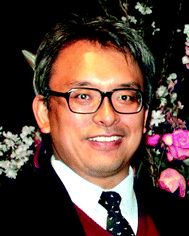 | ||
| Plate1 Katsuhiko Ariga | ||
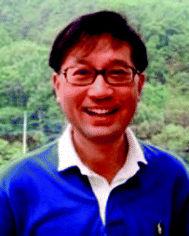 | ||
| Plate2 Seong Keun Kim | ||
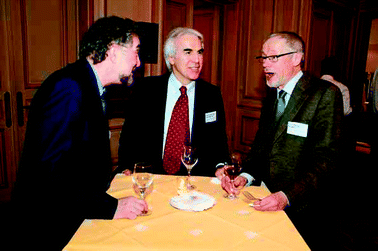 | ||
| Plate3 PCCP Editorial Board members at the Editors' Symposium in Brussels in March 2010. The Editorial Boards of all RSC Publishing journals met for Board meetings and workshops relating to publishing. | ||
Promotion and visibility
As a society journal, supporting the physical chemistry and chemical physics communities is very important to PCCP. We continue to sponsor a variety of international scientific meetings, primarily through awarding PCCP Poster Prizes to some of the best up-and-coming new scientists from a whole range of subject areas, including biophysical chemistry, catalysis and theoretical studies. We congratulate all PCCP prize-winners! Further sponsorship is planned over the next year, and if you have any suggestions for conferences where we could offer PCCP prizes please do let us know at E-mail: pccp@rsc.org.We continue to attend a number of conferences around the globe, to ensure we are aware of the very latest ‘hot’ topics and research developments. This is also a great opportunity to meet our authors, readers and referees and get their feedback about the journal. If PCCP is represented at a conference you're attending, please do come and meet us!
We are also dedicated to making sure the work published in PCCP has the highest visibility possible. This year we have introduced the brand new PCCP blog, which not only contains the latest news from the journal, but is also used to promote the high-quality research we publish. In addition, we also have a PCCP twitter feed—sign-up and follow our tweets today at http://twitter.com/pccp.
Our very best research is highlighted in Chemistry World, the RSC magazine, both in print and online. Our dedicated Press Office also promotes PCCP articles to the wider scientific press, resulting in our content being featured on leading scientific news websites, such as Science Daily. Some recent articles highlighted in Chemistry World have been Daren Caruana and Katherine Holt's Perspective on astroelectrochemistry (DOI: 10.1039/b917817a) and Ruth Lynden-Bell's paper on screening pairs of solute ions in ionic liquids (DOI: 10.1039/b916987c).
Looking forward
Once again we have been able to enjoy the recent success of PCCP, and we thank everyone in the scientific community who has contributed to the journal. PCCP is your journal—it is our authors, Board members, readers and referees who have achieved this success and we sincerely thank you all for your support.We do, however, realise that our hard work needs to continue to ensure that PCCP succeeds further. Although we have implemented many developments to our systems and procedures this year, we plan to build on these to ensure we deliver the highest levels of service to the community for many years to come.
We always welcome your comments, suggestions and feedback; please do contact us at E-mail: pccp@rsc.org.
Wishing you all the best for the coming year,
Jane Hordern, Deputy Editor, PCCP
Philip Earis, Editor, PCCP
Pekka Pyykkö, Chair, PCCP Editorial Board
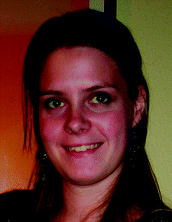 | ||
| Plate4 Jane Hordern | ||
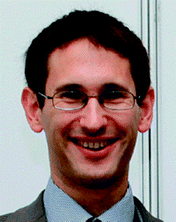 | ||
| Plate5 Philip Earis | ||
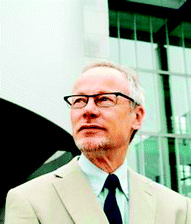 | ||
| Plate6 Pekka Pyykkö | ||
News from RSC publishing
Quality and growth continues
It's quality that really matters at RSC Publishing, and the 2009 Journal Citation Reports® proved that our quality is better than ever as our average impact factor (IF) rose from 4.9 to 5.4. It's an impressive figure, especially when compared with the average for a chemistry journal of 2.4.But we don't rely on just one or two titles to boost our average. It's our entire collection that counts: of the top 20 journals in the multidisciplinary chemistry category, 25% are from RSC Publishing and 90% of our titles have an IF over 3.
Our list of titles continues to grow: Food & Function and Catalysis Science & Technology are the latest titles to join our expanding portfolio. Plus, the number of articles we've published has increased by 74% in the last 2 years alone. We remain committed to providing a world-class publishing service to our authors, and delivering cutting-edge chemical science to readers throughout the world.
The IF and article growth figures provide a clear indication that more researchers than ever before are recognising journals from the RSC as a key resource to access the very best research.
2011 books
With steady front-list growth and cutting-edge content, delivering excellence and authority, the RSC is one of the world's leading chemical science print and online book publishers.Made up of nearly 1000 eBooks equating to one third of a million pages, the RSC eBook Collection delivers outstanding online research and opinion in a multitude of areas of the chemical sciences. Nine new RSC eBook Subject Collections offer additional flexibility.
With over 90 new print titles planned for 2011, including second editions of seminal texts and new RSC Polymer Chemistry and RSC Metallobiology series launching, our contribution to chemistry collections worldwide is diverse, topical and high impact. Expect another first class collection of best selling chemical science titles in 2011.
NEW RSC Publishing platform
Access one million journal articles and book chapters in one simple integrated search.The new RSC Publishing platform has been developed in consultation with the international scientific and librarian community. Together we have identified the best and most valued interface and features that connects you with the highest quality scientific research. With one single search box, easily access our books, journals and databases for students, academics, researchers, scientists and professionals.
Free online access
Free online access is available to all our newest journals, and more—all you need to do is register for an RSC Publishing personal account. Then, when you are logged in, you will be able to access all our free content. Currently this includes:• All content of our newest journals for the first 2 volumes
• Any articles that are part of a special free access promotion (e.g. ‘hot’ papers, web theme issues, etc.)
• All journal content published more than two years ago (dating back to 1997)
• A sample chapter from each book in the RSC eBook Collection
With your username and password you can access the free content any time, any place—all you need is internet access. Register at www.rsc.org/personalregistration.
If your institution is a current customer with registered IP, you will be able to access all free content. Other institutions can apply for free online access to our newest journals using our online form: www.rsc.org/freeaccess.
ChemSpider
Have you heard about the RSC's award winning chemical structure and text based search engine—ChemSpider? It's FREE!ChemSpider provides access to:
• millions of chemical structures
• an abundance of additional property information
• tools to upload, curate and use the data
• a multitude of other online services like the RSC Publishing platform
ChemSpider is one of the richest single sources of structure-based chemistry information.
Visit www.chemspider.com (for mobile devices: cs.m.chemspider.com)
International Year of Chemistry 2011
IUPAC (in conjunction with the UN and UNESCO) have proclaimed 2011 as the International Year of Chemistry (IYC), the goals of which are: to increase the public appreciation of chemistry in meeting world needs; to encourage interest in chemistry among young people; and to generate enthusiasm for the creative future of chemistry.The RSC will be leading the way in IYC 2011, supporting this important initiative through a series of events and activities.
| This journal is © the Owner Societies 2011 |

